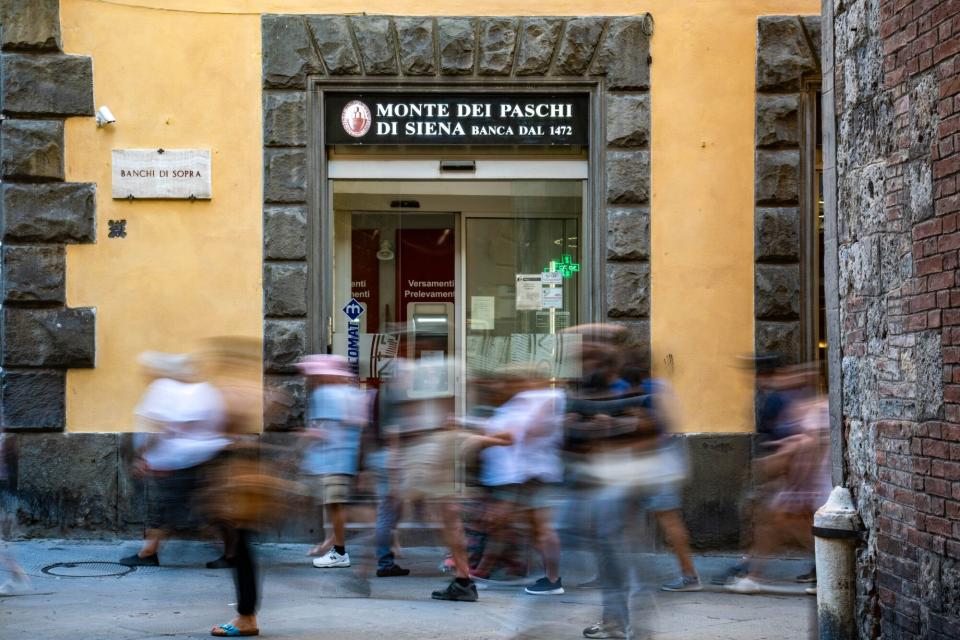Italy Weighs Sale of New Stake in Monte Paschi to Cut Debt
- Oops!Something went wrong.Please try again later.
(Bloomberg) -- Italy’s government is considering selling a stake of up to 10% in lender Banca Monte dei Paschi di Siena SpA in a bid to cut debt and facilitate consolidation in the banking sector.
Most Read from Bloomberg
Nvidia Surges After Company Proclaims AI Has Hit 'Tipping Point'
Biden Touts $1.2 Billion in Student Loan Relief With Eye to 2024
Tech Up in Late Hours on Nvidia’s Bullish Outlook: Markets Wrap
China Tightens Grip on Stocks With Net Sale Ban at Open, Close
The state, which owns about 39% of the bailed-out bank, is assessing the move through an accelerated book-building, placing shares on the market as in a previous sale, according to people familiar with the discussions. A sale could take place as soon as April, though no final decision has been made yet, the people said.
Prime Minister Giorgia Meloni is due to present her government’s latest economic targets and budget framework in early April, and a new sale of Paschi shares could help underpin those targets and improve Italy’s standing with the European Union as it pushes members to clean up their finances. While Italy’s deficit is on a downward path, its debt remains stuck at 140% of economic output.
A spokesperson for the Italian government declined to comment.
Meloni is weighing a new sale as the lock-up period connected with the government’s previous divestment of shares in the lender has now expired, the people said, noting that a final decision has not yet been made. Italian newspaper MF previously reported that the state was weighing the sale of a further 10% by May 20.
Rome remains committed to merging Paschi, considered the world’s oldest bank, with a similar-sized peer, and a relatively small stake sale now would make the remaining holding less expensive for a potential buyer, said the people, who asked not to be named discussing a confidential issue.
A final decision will depend on market opportunities, the people said, adding that Paschi’s recent strong results could make the sale process easier. The government has said it is planning to sell off its full holding by the end of this year, as agreed with the EU.
Italy last year sold about 25% of the lender for approximately €920 million ($1 billion) and it has been searching for an exit strategy for years, including a failed bid to merge it with UniCredit SpA.
Founded in 1472, Paschi was first bailed out by the state 15 years ago after it was hit by souring loans and derivatives deals that backfired. In the following decade it struggled to deliver consistent profit, given limited room for maneuver under terms set by the EU.
Chief Executive Luigi Lovaglio has shown considerable progress in making Paschi more appealing to investors after a turnaround and years of restructuring. The bank announced earlier this month that it’s planning to pay its first dividend in 13 years.
--With assistance from Jeff Black.
Most Read from Bloomberg Businessweek
Hybrid Plug-Ins Are Booming in the World’s Biggest EV Market
How Bad Movie Dubbing Led to the Fake Biden Campaign Robocalls
US Citizens Become Collateral Damage in Global Sanctions Fight
The Dangers of Relying on the US to Power the Global Economy
Gene Therapy Makers Struggle to Find Patients for Miracle Cures
©2024 Bloomberg L.P.



